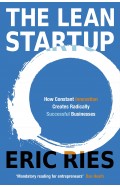- Home
- Online Book Bazar Up To 60%
- Re-Entrepreneuring: How Organizations Can Reignite Their Entrepreneurial Spirit
Re-Entrepreneuring: How Organizations Can Reignite Their Entrepreneurial Spirit
By: Charles-Edouard Bouee
-
Rs 2,495.00
Due to constant currency fluctuation, prices are subject to change with or without notice.
The consequence of this assumption is that large, established organizations tend to be entrepreneur-free zones. Entrepreneurial thinking is tacitly discouraged because it can create novelty, and novelty is a threat to established organizations with large market shares. There is insufficient slack in a modern, lean organization for the entrepreneurial dialectic of speculation and experimentation.
This book will argue that organizations must no longer aspire to be oases of calm in the shifting sands of the global economy. They must adapt to and become one with the market, by reviving the entrepreneurial outlook of their founders.
It is an over-simplification to say that some people have the entrepreneur gene and some don t. We can all be entrepreneurs in an organization that fosters the entrepreneurial outlook. It has more to do with the ways of thinking encouraged by the culture than any inherent differences in talent or aptitude.
The central idea in this book is piecemeal 're-entrepreneuring'. The authors show, with the help of case studies, how the entrepreneurial approach can be applied to all organizations and at all levels, to create new value.
The consequence of this assumption is that large, established organizations tend to be entrepreneur-free zones. Entrepreneurial thinking is tacitly discouraged because it can create novelty, and novelty is a threat to established organizations with large market shares. There is insufficient slack in a modern, lean organization for the entrepreneurial dialectic of speculation and experimentation.
This book will argue that organizations must no longer aspire to be oases of calm in the shifting sands of the global economy. They must adapt to and become one with the market, by reviving the entrepreneurial outlook of their founders.
It is an over-simplification to say that some people have the entrepreneur gene and some don t. We can all be entrepreneurs in an organization that fosters the entrepreneurial outlook. It has more to do with the ways of thinking encouraged by the culture than any inherent differences in talent or aptitude.
The central idea in this book is piecemeal 're-entrepreneuring'. The authors show, with the help of case studies, how the entrepreneurial approach can be applied to all organizations and at all levels, to create new value.
Re-Entrepreneuring: How Organizations Can Reignite Their Entrepreneurial Spirit
By: Charles-Edouard Bouee
Rs 2,495.00 Ex Tax :Rs 2,495.00
Zubin Mehta: A Musical Journey (An Authorized Biography)
By: VOID - Bakhtiar K. Dadabhoy
Rs 840.00 Rs 1,050.00 Ex Tax :Rs 840.00
Losing My Virginity: The Autobiography
By: Sir Richard Branson
Rs 2,605.50 Rs 2,895.00 Ex Tax :Rs 2,605.50
The Lean Startup How Constant Innovation Creates Radically Successful Businesses
By: Eric Ries
Rs 3,795.00 Ex Tax :Rs 3,795.00
The First Mile A Launch Manual for Getting Great Ideas into the Market
By: Scott D. Anthony
Rs 1,836.00 Rs 2,295.00 Ex Tax :Rs 1,836.00
The Hard Thing About Hard Things: Building a Business When There Are No Easy Answers
By: Ben Horowitz
Rs 4,895.00 Ex Tax :Rs 4,895.00
Leading Strategic Change: Bridging Theory and Practice
By: Eric Flamholtz & Yvonne Randle
Rs 636.00 Rs 795.00 Ex Tax :Rs 636.00
Nadella: The Changing Face of Microsoft
By: Jagmohan S. Bhanver
Rs 265.50 Rs 295.00 Ex Tax :Rs 265.50
The Roadside MBA Backroad Lessons for EntrepreneursExecutives and Small Business Owners
By: Scott Schaefer
Rs 1,450.00 Ex Tax :Rs 1,450.00
No similar books from this author available at the moment.
No recently viewed books available at the moment.
Zubin Mehta: A Musical Journey (An Authorized Biography)
By: VOID - Bakhtiar K. Dadabhoy
Rs 840.00 Rs 1,050.00 Ex Tax :Rs 840.00
Re-Entrepreneuring: How Organizations Can Reignite Their Entrepreneurial Spirit
By: Charles-Edouard Bouee
Rs 2,495.00 Ex Tax :Rs 2,495.00














-120x187.jpg?q6)













